Caryn
 After his dad, Eddie Hein passed away from a heart attack, our cousin Larry Hein, did his best to run his business, while helping his mom where he could. His sister, Kim Arani helped too, but she lives in Texas and the rest of the family lives in Montana. Things seemed to be going ok, but then, just a little more than three months later, Larry also suffered a heart attack, and passed away at just 50 years of age. It was a devastating blow to the family, who now had to pick up the pieces yet again.
After his dad, Eddie Hein passed away from a heart attack, our cousin Larry Hein, did his best to run his business, while helping his mom where he could. His sister, Kim Arani helped too, but she lives in Texas and the rest of the family lives in Montana. Things seemed to be going ok, but then, just a little more than three months later, Larry also suffered a heart attack, and passed away at just 50 years of age. It was a devastating blow to the family, who now had to pick up the pieces yet again.
Larry was a good kid. I first got to know him when my husband, Bob Schulenberg and I took our girls for a visit to his grandparents, Walt and Vina Hein’s ranch outside of Forsyth, Montana. Larry was just a young boy then, but he was good to his grandparents and his parents too. He also spent time entertaining our daughters,  Corrie Petersen and Amy Royce, as will as his little sister, Kim. Grandma Hein loved having Larry come for visits. He used to help out aren’t the place, and anyone who has ever run a ranch can tell you that you can never have enough help around the ranch.
Corrie Petersen and Amy Royce, as will as his little sister, Kim. Grandma Hein loved having Larry come for visits. He used to help out aren’t the place, and anyone who has ever run a ranch can tell you that you can never have enough help around the ranch.
Larry’s expertise did not lie in ranching, however. Larry was a mechanic. and Larry also loved to tow vehicles to his shop for those repairs. A number of years back, Larry fulfilled his life-long dream of owning his own shop. It wasn’t far from his parents’ home in Forsyth, and he did a bang-up business. The lot was always full of vehicles waiting to be worked on. Being a mechanic’s wife myself, I can tell you that the mark  of a great mechanic is the number of vehicles waiting in line. If the mechanic isn’t good they will go elsewhere. If he is good, they will wait in line rather that letting someone else touch their vehicle. Well, at Larry’s shop…there was always a line.
of a great mechanic is the number of vehicles waiting in line. If the mechanic isn’t good they will go elsewhere. If he is good, they will wait in line rather that letting someone else touch their vehicle. Well, at Larry’s shop…there was always a line.
It’s hard to believe that Larry and his dad have been in Heaven for over a year now. It just doesn’t seem possible, but I’m sure that is what his mom and sister think too. Time just flies after a loved one has passed away. Before we know it ten years have gone by. The human mind struggles to take it in. Today would have been Larry’s 52th birthday. Happy birthday in Heaven, Larry. I know you and your dad are having the time of your lives. We love and miss you very much.
 My grandniece, Katy Balcerzak has spent the last year, and a little bit more, becoming or being mommy to a sweet little boy named Max Robert Herr. That is no easy transition, although it is one of the most wonderful transitions ever, as any mother can tell you. For any “exercise enthusiast,” it means the sacrifice of that their body was, to working toward bring it back to what it was, but in reality, it doesn’t matter, because the reward is the most wonderful reward one could ever receive. A child, sweet and perfect. Boy or girl…it does not matter, because a mother’s love knows no gender. It is the transition into a slower way of life…maybe not always being on time everywhere you go, because babies can’t tell time, and so their cooperation is definitely random.
My grandniece, Katy Balcerzak has spent the last year, and a little bit more, becoming or being mommy to a sweet little boy named Max Robert Herr. That is no easy transition, although it is one of the most wonderful transitions ever, as any mother can tell you. For any “exercise enthusiast,” it means the sacrifice of that their body was, to working toward bring it back to what it was, but in reality, it doesn’t matter, because the reward is the most wonderful reward one could ever receive. A child, sweet and perfect. Boy or girl…it does not matter, because a mother’s love knows no gender. It is the transition into a slower way of life…maybe not always being on time everywhere you go, because babies can’t tell time, and so their cooperation is definitely random.  Somehow that doesn’t matter either, because there is nothing more important than that sweet, smiling face. A mother might have good intentions of being on time, but then her son smiles and giggles and she takes a few more minutes playing and coaxing one more precious smile out of her precious boy. Before she knows it, time has slipped away, and she is trying…unsuccessfully, to play catch-up. Oh well, it somehow just doesn’t matter.
Somehow that doesn’t matter either, because there is nothing more important than that sweet, smiling face. A mother might have good intentions of being on time, but then her son smiles and giggles and she takes a few more minutes playing and coaxing one more precious smile out of her precious boy. Before she knows it, time has slipped away, and she is trying…unsuccessfully, to play catch-up. Oh well, it somehow just doesn’t matter.
Katy has wanted to be a mommy for as long as she was grown up, and the past year was like a dream-come-true. Her life went from mediocre to exceptional so quickly, that it stunned many of us…myself included. She moved to Colorado from Wyoming, and the next thing I knew, she was happily engaged and pregnant with her first child. Her face absolutely glowed. Her beautiful smile was always there…no sad pictures, no  lonely pictures, no pictures with empty arms. Katy was transformed in an instant.
lonely pictures, no pictures with empty arms. Katy was transformed in an instant.
This year also, Katy and Dylan made the move to purchase their first home…another milestone in their lives, and one more thing to cross off her “bucket list” of goals and dreams. Now, they are settling in, Katy’s life is in perfect balance. She has the man of her dreams, and a sweet baby boy to complete her happiness. And now, the house to wrap things up nicely and tie them in a pretty bow. I can’t think of any better way to have spent the last year. Today is Katy’s birthday. Happy birthday Katy!! Have a great day!! We love you!!

 When people doesn’t understand the world around themselves, huge mistakes can be made that affect the world, or at least a good part of it, for a long time. In 1958, Mao Zedong, the leader of the People’s Republic of China was about to make just such a mistake. In a move he called The Great Leap Forward, designed to reconstruct the country from an agrarian economy into large-scale industrialization. Part of this was the Four Pests campaign against flies, mosquitoes, rats, and sparrows. Now I can understand why Zedong considered flies, mosquitoes, and rats pests, but sparrows not so much, although, I suppose some people might disagree with me.
When people doesn’t understand the world around themselves, huge mistakes can be made that affect the world, or at least a good part of it, for a long time. In 1958, Mao Zedong, the leader of the People’s Republic of China was about to make just such a mistake. In a move he called The Great Leap Forward, designed to reconstruct the country from an agrarian economy into large-scale industrialization. Part of this was the Four Pests campaign against flies, mosquitoes, rats, and sparrows. Now I can understand why Zedong considered flies, mosquitoes, and rats pests, but sparrows not so much, although, I suppose some people might disagree with me.
Zedong basically told his nation to take pots and pans to kill all the sparrows. His campaign was successful. Millions of sparrows were killed, but this left crops vulnerable to locusts…normally kept under control by the sparrows. This agricultural policy, poor weather, and famine led to the deaths of 45 million people. Among all the incidents of mass murder caused by states in the 20th century, probably the least known in the English-speaking world is the Great Leap Forward of Mao Zedong. For some reason, the Great Leap Forward was considered somehow important enough to earn a place in the Black Book of Communism, in a description so horrifying it would haunt anyone who read about it.
Looking back on the process, so many things were done wrong. First, the rulers presumed to know a better path, when indeed, they knew nothing about what they were doing. Then, to make matters worse, they beat the population into submission in order that the plan could be implemented. The plan was intensified by a wild political enthusiasm among the population. For some reason, or maybe like the Nazis, the citizen enforcers were often worse than the tyrants at the top. In the famine that followed…well, most of us have no idea what went on. For example, all livestock was eaten or died, and the pillaging of property effectively ended the possibility of domesticating animals. Before long, there were no animals. Something we don’t think about, nor will I go into detail, there was no fat for cooking whatever food was left. People were dying, and well…corpses were used for fat as needed. Think about this the next time you prepare dinner. Think of cooking without oils at all, no butter, corn oil, bacon, or any other fat at all. Be thankful for markets that make oil, butter, and such. Things shouldn’t be taken for granted.
China’s “Great Leap Forward” in 1958-1961 became one of the worse disasters in human history. The dis hewn of deeply misguided industrialization and food procurement policies led to the deaths of around thirty-five million people from starvation and prevented the births of perhaps forty million more. Weather conditions were not unusual in these years; the famine was entirely man-made. Zedong and his fellow leaders were determined to show the superiority of communism, to quickly overtake production levels in Russia and in Britain, and to establish Mao’s leadership of the communist world. Outlandish production targets were set to match the food needs of rapidly industrializing cities and to earn foreign exchange through exports of food. Under the totalitarian system maintained by the Communist Party of China, rural communes competed to exaggerate their output, further inflating the already unattainable procurement quotas and leaving nothing for the people to eat. The Communist Party caused further chaos in the countryside by ordering that all private land be turned into communes, confiscating private property and even private cooking utensils, and making people eat in communal kitchens.
That, as well as the enormous increases in production that were confidently expected, peasant labor was diverted to public works projects and rural steel-making plants, which achieved nothing. Travel restrictions stopped communication, meaning word of what was going on, didn’t out from getting out. The penalties for disobedience were clear. In all, three-quarters of a million people were executed in 1950-51. Still in the early years, of the revolution, the Party was widely trusted. When Zedong learned of the disasters, you would have thought he would have taken measures to save the people, but his goal was to hide the facts. He doubled down on the policies, purging the messengers, labeling them “right-deviationists,” and blaming peasants for secretly hoarding food. Anything else would have made him look like a bad leader…at least in his own mind.
If Zedong had changed course when the extent of the mass starvation first became clear to the leadership, the famine would have lasted one year and not three, and in any case there was more than enough grain in government stores to prevent everyone from starving. Life expectancy in China, which was nearly 50 in 1958, fell to below 30 in 1960; five years later, once Mao had stopped killing people, it had risen to nearly 55. Nearly a third of those born during the Great Leap Forward did not survive it.
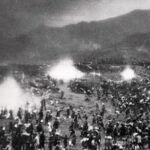

Zedong was born December 26, 1893, Shaoshan, Hunan province, China. In his political career, he was the principal Chinese Marxist theorist, soldier, and statesman who led his country’s communist revolution. Mao was the leader of the Chinese Communist Party (CCP) from 1935 until his death, and he was chairman (chief of state) of the People’s Republic of China from 1949 to 1959 and chairman of the party also until his death on September 9, 1976 in Beijing, China. I guess he survived the Great Leap Forward, unlike many of his people.
 Originally, in the United States, each branch of the service had their own day to celebrate their service, but on August 31, 1949, Defense Secretary Louis Johnson announced the creation of an Armed Forces Day to replace separate Army, Navy, Air Force, Marine Corps, and Coast Guard Days. There was a good reason for it. The combination coincided with the unification of the three branches of the service under one agency…the Department of Defense. Man countries have an Armed Forces Day, and they are all done a little differently. In the United States, Armed Forces Day is celebrated on the third Saturday in May, which is near the end of Armed Forces Week, which begins on the second Saturday of May and ends on the third Sunday of May, or the fourth Saturday if the month begins on a Sunday, such as in 2016. Following the creation of Armed Forces Day in 1949, the holiday was first observed on May 20, 1950.
Originally, in the United States, each branch of the service had their own day to celebrate their service, but on August 31, 1949, Defense Secretary Louis Johnson announced the creation of an Armed Forces Day to replace separate Army, Navy, Air Force, Marine Corps, and Coast Guard Days. There was a good reason for it. The combination coincided with the unification of the three branches of the service under one agency…the Department of Defense. Man countries have an Armed Forces Day, and they are all done a little differently. In the United States, Armed Forces Day is celebrated on the third Saturday in May, which is near the end of Armed Forces Week, which begins on the second Saturday of May and ends on the third Sunday of May, or the fourth Saturday if the month begins on a Sunday, such as in 2016. Following the creation of Armed Forces Day in 1949, the holiday was first observed on May 20, 1950.
In his speech proclaiming the day as Armed Forces Day, on February 27, 1950, President Truman stated, “Armed Forces Day, Saturday, May 20, 1950, marks the first combined demonstration by America’s defense  team of its progress, under the National Security Act, toward the goal of readiness for any eventuality. It is the first parade of preparedness by the unified forces of our land, sea, and air defense.” Of course, there is more to planning a holiday that a day and a speech. The first Armed Forces Day was celebrated by parades, open houses, receptions, and air shows. The longest continuously running Armed Forces Day Parade in the United States is held in Bremerton, Washington.
team of its progress, under the National Security Act, toward the goal of readiness for any eventuality. It is the first parade of preparedness by the unified forces of our land, sea, and air defense.” Of course, there is more to planning a holiday that a day and a speech. The first Armed Forces Day was celebrated by parades, open houses, receptions, and air shows. The longest continuously running Armed Forces Day Parade in the United States is held in Bremerton, Washington.
There were a few glitches, however. The unique training schedules of the National Guard and Reserve units make the specific Saturday celebration difficult for these branches, so they have adapted to celebrate Armed Forces Day/Week over any period in the month of May. Every nation needs to celebrate the military forces. Where would we be without a strong military. As President Truman said, “It is vital to the security of the nation and to the establishment of a desirable peace.”
Each year, Armed Forces Day theme is different, because of course, each year more and more has changed. The very first theme was “Teamed for Defense.” Over the years, other themes have included Appreciation of a Nation; Arsenal of Freedom and Democracy; Dedication and Devotion; Deter if Possible, Fight if Necessary;  Freedom; Freedom Through Unity; Guardians of Peace; Lasting Peace; Liberty; and Patriotism. In Washington DC, 10,000 troops of all branches of the military, cadets, and veterans marched past the president and his party. In New York City, an estimated 33,000 participants initiated Armed Forces Day “under an air cover of 250 military planes of all types.” Today, Armed Forces Day is celebrated in American communities and on military bases throughout the world with parades, picnics, shopping discounts, festivals, and parties. On May 19, 2017, President Donald Trump reaffirmed the Armed Forces Day holiday, marking the 70th anniversary since the creation of the Department of Defense.
Freedom; Freedom Through Unity; Guardians of Peace; Lasting Peace; Liberty; and Patriotism. In Washington DC, 10,000 troops of all branches of the military, cadets, and veterans marched past the president and his party. In New York City, an estimated 33,000 participants initiated Armed Forces Day “under an air cover of 250 military planes of all types.” Today, Armed Forces Day is celebrated in American communities and on military bases throughout the world with parades, picnics, shopping discounts, festivals, and parties. On May 19, 2017, President Donald Trump reaffirmed the Armed Forces Day holiday, marking the 70th anniversary since the creation of the Department of Defense.
 Through the years, Russia, also known as the Soviet Union and the USSR, has been sometimes ally and sometimes enemy of the United States. World War I and World War II found the Soviet Union once again on the side of good as a part of the Allied Forces. The main countries in the Allied powers of World War I were France, the British Empire and the Russian Empire. The main Allied powers of World War II were France, Great Britain, the United States, China, and the Soviet Union. So in these two wars anyway, the United States and Russia were on the same side. The three principal partners in the Axis alliance in World War II were Germany, Italy, and Japan. They were joined by Bulgaria, Hungary, Romania and Thailand, who also signed the Tri-Partite Pact as member states.
Through the years, Russia, also known as the Soviet Union and the USSR, has been sometimes ally and sometimes enemy of the United States. World War I and World War II found the Soviet Union once again on the side of good as a part of the Allied Forces. The main countries in the Allied powers of World War I were France, the British Empire and the Russian Empire. The main Allied powers of World War II were France, Great Britain, the United States, China, and the Soviet Union. So in these two wars anyway, the United States and Russia were on the same side. The three principal partners in the Axis alliance in World War II were Germany, Italy, and Japan. They were joined by Bulgaria, Hungary, Romania and Thailand, who also signed the Tri-Partite Pact as member states.
On May 12, 1942, Soviet forces under the command of Marshal Semyon Timoshenko attacked the German 6th 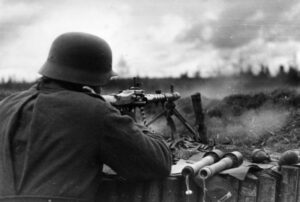 Army from a vulnerable point established during the winter counter-offensive. After a promising start, the offensive was stopped on May 15th by massive airstrikes. There were a number of critical Soviet errors by several staff officers and by Joseph Stalin, who failed to accurately estimate the 6th Army’s potential and overestimated their own newly raised forces, facilitated a German pincer attack on May 17th which cut off three Soviet field armies from the rest of the front by May 22nd. The Soviet Army was hemmed into a narrow area, and the 250,000-strong Soviet force inside the pocket was exterminated from all sides by German armored, artillery, and machine gun firepower, as well as 7,700 tons of air-dropped bombs. After six days of encirclement by the German Army, the Soviet resistance ended as their troops were killed or taken prisoner. It was a devastating loss for the Soviets.
Army from a vulnerable point established during the winter counter-offensive. After a promising start, the offensive was stopped on May 15th by massive airstrikes. There were a number of critical Soviet errors by several staff officers and by Joseph Stalin, who failed to accurately estimate the 6th Army’s potential and overestimated their own newly raised forces, facilitated a German pincer attack on May 17th which cut off three Soviet field armies from the rest of the front by May 22nd. The Soviet Army was hemmed into a narrow area, and the 250,000-strong Soviet force inside the pocket was exterminated from all sides by German armored, artillery, and machine gun firepower, as well as 7,700 tons of air-dropped bombs. After six days of encirclement by the German Army, the Soviet resistance ended as their troops were killed or taken prisoner. It was a devastating loss for the Soviets.
The Counter-offensive of the Second Battle of Kharkov, was called Operation Fredericus, and was launched by the Axis forces in the region around Kharkov against the Red Army Izium bridgehead offensive, and was conducted from May 12 to May 28, 1942, on the Eastern Front during World War II. The objective was to 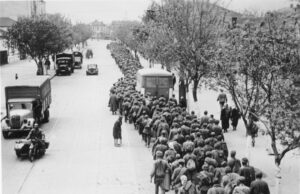 eliminate the Izium bridgehead over Seversky Donets, also known as the “Barvenkovo bulge,” which was one of the Soviet offensive’s staging areas. A winter counter-offensive drove German troops away from Moscow, but depleted the Red Army’s reserves. The Kharkov offensive was next Soviet attempt to expand their strategic initiative, although it failed to secure a significant element of surprise. The battle ended up being an overwhelming German victory, with 280,000 Soviet casualties compared to just 20,000 for the Germans and their allies. The German Army Group South pressed its advantage, encircling the Soviet 28th Army on June 13 in Operation Wilhelm and pushing back the 38th and 9th Armies on June 22.
eliminate the Izium bridgehead over Seversky Donets, also known as the “Barvenkovo bulge,” which was one of the Soviet offensive’s staging areas. A winter counter-offensive drove German troops away from Moscow, but depleted the Red Army’s reserves. The Kharkov offensive was next Soviet attempt to expand their strategic initiative, although it failed to secure a significant element of surprise. The battle ended up being an overwhelming German victory, with 280,000 Soviet casualties compared to just 20,000 for the Germans and their allies. The German Army Group South pressed its advantage, encircling the Soviet 28th Army on June 13 in Operation Wilhelm and pushing back the 38th and 9th Armies on June 22.

 My niece, Andrea Beach is a single mom to her son, Topher Spicer. The two of them are very close, as often happens in these types of circumstances. She is very proud of Topher. Andrea works as a chef at the Turnbuckle Tavern in Rawlins, Wyoming. She has been there for a long time, and they depend on her heavily. Andrea has wanted to be a chef for some time, and in a way, this is a dream come true. Rawlins is a small town, and jobs there are scarce, so the fact that she get to do something she likes is really great.
My niece, Andrea Beach is a single mom to her son, Topher Spicer. The two of them are very close, as often happens in these types of circumstances. She is very proud of Topher. Andrea works as a chef at the Turnbuckle Tavern in Rawlins, Wyoming. She has been there for a long time, and they depend on her heavily. Andrea has wanted to be a chef for some time, and in a way, this is a dream come true. Rawlins is a small town, and jobs there are scarce, so the fact that she get to do something she likes is really great.
Andrea is starting to look forward to summer, like so many others of us. She enjoys going to the Black Hills in South Dakota, a place that is very special to our entire family. It’s not too far from where we all live, and there is lots to do. I don’t think Andrea hikes, like my husband and I do, but that’s the beauty of the Black Hills…something for everybody. There’s lots of shopping and tourist attractions, as well as beautiful drives and scenery.
Andrea also likes to paint. There seem to be a number of artists in our family, but I definitely am not one of them. Andrea seems to have inherited that artistic gene, as have several other members of my family. As for the rest of us…those who are not artistic, we will just have to enjoy the work of the ones who are artistic.
Of course, the most important thing in Andrea’s life will always be her son. Topher has had a number of 
 interests through the years…soccer, drama, and broadcasting. Every child has to try new things before they settle on what they want to do. It takes good parents to allow their child to explore new ideas and phases, being supportive all the way. That is how Andrea is. Topher is able to explore new interests, and Andrea is right there with him. Some day, he will settle on what he wants to do, and she will be right there to support him all the way. That is a good mom. I think she learned from her mom. Today is Andrea’s birthday. Happy birthday Andrea!! Have a good day!! We love you!!
interests through the years…soccer, drama, and broadcasting. Every child has to try new things before they settle on what they want to do. It takes good parents to allow their child to explore new ideas and phases, being supportive all the way. That is how Andrea is. Topher is able to explore new interests, and Andrea is right there with him. Some day, he will settle on what he wants to do, and she will be right there to support him all the way. That is a good mom. I think she learned from her mom. Today is Andrea’s birthday. Happy birthday Andrea!! Have a good day!! We love you!!
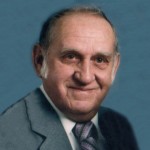
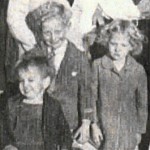 My Uncle Larry Byer was talented in music. He played the guitar, the mandolin, and the piano. My grandfather, his dad, George Byer played the mandolin and the violin. My dad, Al Spencer and my Uncle George both played guitar. They had a regular band, and their jam sessions were like a big party at the Byer house. The kids all had friends who came over as much as they could to listen to the concerts. There were others that joined in sometimes playing the instruments they knew too. It made for a great Saturday night hot spot. Uncle Larry, Grandpa, my dad, and Uncle George are all in Heaven now, and I’ll bet they are all still having those jam sessions, and enjoying the fun times. A Heavenly Band is always in demand.
My Uncle Larry Byer was talented in music. He played the guitar, the mandolin, and the piano. My grandfather, his dad, George Byer played the mandolin and the violin. My dad, Al Spencer and my Uncle George both played guitar. They had a regular band, and their jam sessions were like a big party at the Byer house. The kids all had friends who came over as much as they could to listen to the concerts. There were others that joined in sometimes playing the instruments they knew too. It made for a great Saturday night hot spot. Uncle Larry, Grandpa, my dad, and Uncle George are all in Heaven now, and I’ll bet they are all still having those jam sessions, and enjoying the fun times. A Heavenly Band is always in demand.
Uncle Larry was also a funny guy. He loved a good joke, as well as pulling a few pranks now and then. You never knew what he might do, and that was part of his charm. Together with my mom, Collene Spencer and my Uncle Wayne Byer, there was never a dull moment. What one didn’t think of another did. They were truly like the Three Musketeers!! My grandma, Hattie Byer was often forced to give them an “attitude adjustment” to straighten them out. All in all, they were good kids though…just mischievous.
When he grew up, Uncle Larry served in the United States Army, in the Korean War. While fighting a war would b the pits, my guess is that Uncle Larry took his famous humor with him, and was probably a great asset to the morale of the troops. In fighting a war, it helps to have a little humor. I helps the soldiers to let off steam. War is an ugly event, and sometimes a good laugh is very much needed. In those cases, Uncle Larry would have been the man for the job, in my opinion. Still, Uncle Larry could be serious when it was required of him, and he was a great soldier too. He served his country honorably, and when he was honorably discharged, he came 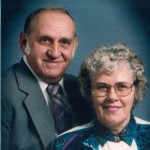
 home and rekindled a friendship with his future wife, Jeanette Morton, who had been a family friend for years. They married on February 11, 1956. Their son Larry Wayne Byer was born a year later on February 9, 1957, and daughter Tina followed on November 12, 1958. Their family was complete…until the grandchildren came along that is. Uncle Larry left us for his Heavenly home on December 22, 2011. Today he would have been 87 years old. Happy birthday in Heaven, Uncle Larry. Strike up the band and have a great party. We love and miss you very much.
home and rekindled a friendship with his future wife, Jeanette Morton, who had been a family friend for years. They married on February 11, 1956. Their son Larry Wayne Byer was born a year later on February 9, 1957, and daughter Tina followed on November 12, 1958. Their family was complete…until the grandchildren came along that is. Uncle Larry left us for his Heavenly home on December 22, 2011. Today he would have been 87 years old. Happy birthday in Heaven, Uncle Larry. Strike up the band and have a great party. We love and miss you very much.

 Our aunt, Charlys Schulenberg is a wonderfully sweet person, as anyone who knows her can attest. She is an amazing cook, and even better, it is something she loves to do. She definitely spoils anyone who comes to her house for a visit. Charlys is the kind of person everybody love to be around. She’s friendly and welcoming, and when you leave her home, you know you have been taken care of. Aunt Charlys is the perfect complement to Uncle Butch. He is the teller of stories, and she is the giver of comfort. You may not even have known that you needed a giver of comfort, but when you leave her home, you know that you did. It may not be because you are sad, although I’m sure she would be very comforting then too, but just that we all work hard in life, and it’s nice to sit down and be taken care of sometimes. She works too hard, of course, often refusing your help, in her effort to have you relax, but what she sets out to do, she does very well. Part of her charm is her wonderful comfort food.
Our aunt, Charlys Schulenberg is a wonderfully sweet person, as anyone who knows her can attest. She is an amazing cook, and even better, it is something she loves to do. She definitely spoils anyone who comes to her house for a visit. Charlys is the kind of person everybody love to be around. She’s friendly and welcoming, and when you leave her home, you know you have been taken care of. Aunt Charlys is the perfect complement to Uncle Butch. He is the teller of stories, and she is the giver of comfort. You may not even have known that you needed a giver of comfort, but when you leave her home, you know that you did. It may not be because you are sad, although I’m sure she would be very comforting then too, but just that we all work hard in life, and it’s nice to sit down and be taken care of sometimes. She works too hard, of course, often refusing your help, in her effort to have you relax, but what she sets out to do, she does very well. Part of her charm is her wonderful comfort food.
Aunt Charlys married our uncle, Butch Schulenberg on June 25, 1966. and their marriage has been blessed with three children Tadd, Andi Kay, and Heath. To that number have been added seven grandchildren, Savanna, Gage, and Sophie Schulenberg; Calen Bell; Christian, Heath, and Ethan Schulenberg, and I probably don’t have them in the correct order. The blessings just keep growing. She and Uncle Butch are soulmates, and as close as they can be. They can almost read each other’s thoughts, and the peace in their home is known to anyone who walks into it.
Aunt Charlys and Uncle Butch love to travel, and spend time in Sheridan, Wyoming where two of their children live, as well as Helena, Montana where the other one lives. They also like to go other places, but their family is the top priority, so they go to see them as often as they can. They have a camper, so they have a place to stay wherever they roam. Bob and I have gone to visit a couple of times, but the Covid-19 virus stopped us from going last year. We are hoping to get back up for a visit very soon. Today is Aunt Charlys birthday. Happy birthday Aunt Charlys!! Have a great day!! We love you!!

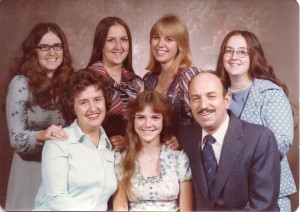 My sister, Cheryl Masterson is one of the most honorable people I know. She lives her life on purpose…following the will of God, and being a blessing to everyone she comes in contact with. Cheryl doesn’t just live a respectable life out in public, but lives that same respectable kind of life in private. She is a prayer warrior and is willing to pray without ceasing when needed. If you find yourself in a bad situation, Cheryl is definitely one of the people you want to have praying for you.
My sister, Cheryl Masterson is one of the most honorable people I know. She lives her life on purpose…following the will of God, and being a blessing to everyone she comes in contact with. Cheryl doesn’t just live a respectable life out in public, but lives that same respectable kind of life in private. She is a prayer warrior and is willing to pray without ceasing when needed. If you find yourself in a bad situation, Cheryl is definitely one of the people you want to have praying for you.
Cheryl is a family-first kind of person. Her children, grandchildren, great grandchildren, as well as sisters and  their families are her priority, second only to God. Her favorite things to do revolve around her kids and grandkids. She loves having family dinners, where all of her family come to eat and spend time together. Traditionally, Cheryl has a day or two a week when she cooks a big meal and her family all join her for dinner. Cheryl lives in our family home. During the last years of our parents lives, she was the live-in caregiver to them, while the rest of us put in time during the day. After our dad, Al Spencer’s passing, our mom, Collene Spencer made out her will, giving the house to her daughters, with a lifetime estate to Cheryl. The rest of us had homes, and it is a fitting reward for all the time Cheryl gave to their care. Now that our parents are both in Heaven, Cheryl no longer has patients to care for, freeing her up to entertain her family. She spends a lot of time with her youngest grandchild, Aleesia Spethman. They are very close and they enjoy their time together very much.
their families are her priority, second only to God. Her favorite things to do revolve around her kids and grandkids. She loves having family dinners, where all of her family come to eat and spend time together. Traditionally, Cheryl has a day or two a week when she cooks a big meal and her family all join her for dinner. Cheryl lives in our family home. During the last years of our parents lives, she was the live-in caregiver to them, while the rest of us put in time during the day. After our dad, Al Spencer’s passing, our mom, Collene Spencer made out her will, giving the house to her daughters, with a lifetime estate to Cheryl. The rest of us had homes, and it is a fitting reward for all the time Cheryl gave to their care. Now that our parents are both in Heaven, Cheryl no longer has patients to care for, freeing her up to entertain her family. She spends a lot of time with her youngest grandchild, Aleesia Spethman. They are very close and they enjoy their time together very much.
Cheryl is also artistically inclined, and has made many things for our homes. I still use one of basket decorations she made for me when my husband and I bought our home in 1995. I love it, and it brightens my breakfast nook. I don’t tend to be as artistically inclined, so when we bought our house, Cheryl was a huge help in it’s decoration. We had been living in a smaller mobile home, so there were a lot of walls to decorate in the 
 new house. It was a little overwhelming for me, but she made it seem easy. My other sisters, Caryl Reed, Alena Stevens, and Allyn Hadlock, as well as my parents helped too, and in the end, I loved the look. I have been very blessed to have the sisters I do, and Cheryl, being the eldest has always been the leader, and in many ways, now the spiritual leader of the Sister Prayer Warriors. Today is Cheryl’s birthday. Happy birthday Cheryl!! Have a great day!! We love you!!
new house. It was a little overwhelming for me, but she made it seem easy. My other sisters, Caryl Reed, Alena Stevens, and Allyn Hadlock, as well as my parents helped too, and in the end, I loved the look. I have been very blessed to have the sisters I do, and Cheryl, being the eldest has always been the leader, and in many ways, now the spiritual leader of the Sister Prayer Warriors. Today is Cheryl’s birthday. Happy birthday Cheryl!! Have a great day!! We love you!!
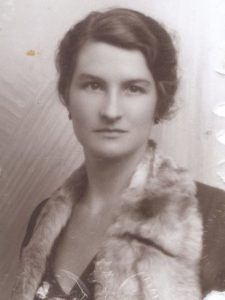
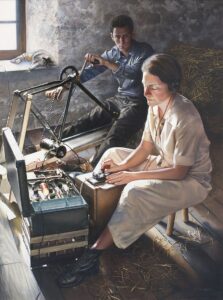 During World War II, the Allies used a number of spies, many of them women, but none of them could compare to Virginia Hall, who was considered by the Nazis to be the “most dangerous of all Allied spies.” I can’t think of a greater honor for a spy. It seems to me that the women spies were really the best spies of the war. Maybe it was because they just didn’t expect the women to be spies. That was a big advantage. Virginia Hall had one other thing that made it seem impossible to think of her as a spy…a prosthetic leg, which created a bit of a limp. It was the leg that earned Hall her other name…Limping Lady.
During World War II, the Allies used a number of spies, many of them women, but none of them could compare to Virginia Hall, who was considered by the Nazis to be the “most dangerous of all Allied spies.” I can’t think of a greater honor for a spy. It seems to me that the women spies were really the best spies of the war. Maybe it was because they just didn’t expect the women to be spies. That was a big advantage. Virginia Hall had one other thing that made it seem impossible to think of her as a spy…a prosthetic leg, which created a bit of a limp. It was the leg that earned Hall her other name…Limping Lady.
Born to wealthy parents in Baltimore, Maryland in 1906, Hall was expected to marry well, and become a wife and mother, but she had other plans. Describing herself as “cantankerous and capricious, Hall set her sights on being a diplomat after studying in Paris and falling in love with France, but out of 1500 US diplomats, only 6 were women, and Hall was turned down several times. Still hoping, she took a job as a clerical worker and the US Embassy in Warsaw, Poland. Then tragically, a hunting accident on a trip to Turkey, followed by gangrene infecting the leg, caused it to require amputation, which also disqualified her from the US Foreign Service. It was a crushing blow. She decided to resign from her job and move to Paris in 1939, just as World War II was erupting.
Hall’s life took a dramatic turn on May 10, 1940, when Germany invaded France. Volunteering to drive ambulances for the French army during the six-week long Battle of France, Hall transported wounded soldiers from the front line, while dodging fire from German fighter planes overhead. With the French surrender, Hall traveled to London to support the British war effort there. As she traveled, she impressed an undercover agent who put her in touch with a senior officer in the Special Operations Executive (SOE), which was Winston Churchill’s new secret service. Female operatives were not employed By the SOE, but after six months of failing to infiltrate a single new agent into France, they decided to send Hall to France as the SOE’s first female agent in the country. In the end, she would spend nearly the entire war in France, first as a spy for Britain’s SOE and later for the US Office of Strategic Services (OSS) Special Operations Branch.
Hall had a bit of a sense of humor, especially when it came to her heavy wooden leg, even nicknaming it Cuthbert. The leg was no obstacle to Hall’s courage either, nor her determination to defeat the Nazis, whom she bitterly hated. Hall used everything at her disposal while undercover in France, and proved herself “exceptionally adept at eluding the Gestapo as she organized resistance groups, masterminded jailbreaks for captured agents, mapped drop zones, reported on German troop movements, set up safe houses, and rescued escaped POWs and downed Allied pilots.” Like many veterans of that era, Even years after the war, Hall rarely talked about her extraordinary career. She attributes the habit to her years as a spy. She once said, “Many of my friends were killed for talking too much.”
Spy networks were amazingly able to hide in plane site, and when Hall arrived in the Vichy region of France in August 1941, it was under the cover story of being a war correspondent for the New York Post newspaper. Following her arrival in Toulouse, Hall established a resistance network called HECKLER, which gathered information about German troop movements and helped downed British pilots escape to safety. Following her work in Toulouse, she traveled to Lyon, where she helped coordinate activities of the French Resistance. Her plans changed when the United States entered the war. As a US citizen, she could be considered a traitor for working for the British spy networks, because the United States had been considered neutral. Hall was forced underground, but continued operating in France for another 14 months. A good spy needs to have a variety of disguises at the disposal, and Hall became adept at changing her appearance on a moment’s notice. She was also known by multiple aliases. She needed to be almost invisible, at least to the enemy. The Germans, at least early in the war, didn’t think that a woman was capable of being a spy. What a serious miscalculation that turned out to be!!
Hall’s extraordinary effectiveness amazed the SOE commanders and helped change their minds about women operating in combat zones. A year after Hall began working undercover, the SOE finally decided to send more female agents into the field. Hall’s abilities paved the way for more women to serve their countries in this important capacity. It also quickly put women spies, and Hall specifically, on the radar for the Gestapo. Soon, the hunt for “the Limping Lady” was on. They knew only her from a composite sketch, which was to her advantage. Their internal communications declared: “She is the most dangerous of all Allied spies. We must find and destroy her.” Gestapo agents…including notorious investigator Klaus Barbie, who would later be awarded the Iron Cross for torturing and executing thousands of resisters…closing in on her after the Germans seized control of Vichy France in November 1942, Hall was forced to escape to Spain.
To escape France was no easy task. It meant a three day journey on foot in heavy snow across the Pyrenees mountains. The trek was made even more challenging with an 8-pound artificial leg bound to her body with straps and a belt at the waist. At one point, she jokingly mentioned in a message to the SOE that she was concerned that “Cuthbert” would cause problems during her escape. In a funny twist, the receiver of the message didn’t recognize the nickname she used for her prosthetic. SOE headquarters responded, “If Cuthbert is giving you difficulty, have him eliminated.” In the end, it wasn’t “Cuthbert” that caused her problems. When she arrived in Spain, she was arrested and imprisoned for illegally entering the country. Hall was an inmate for six weeks before an inmate being released was able to get word to American officials in Barcelona about her presence so they could arrange her release. She finally made it back to London in January 1943, where she was quietly made a honorary Member of the Order of the British Empire.
Following her imprisonment, the SOE refused to send her back to France, because they thought was too dangerous with her high profile. That decision was unacceptable to Hall, who decided to join the American Office of Strategic Services (OSS), which was just establishing their own intelligence operation in France. The Nazi troops were everywhere by that time, so Hall took even more extreme measures to disguise herself. Among them, a French milkmaid, causing her to need to have a rather scary dentist grind down her lovely, white American teeth. In the Haute-Loire region of central France, she disguised herself as an elderly milkmaid and got to work on her radio, coordinating airdrops of arms and supplies for the resistance fighters who were blowing up bridges and sabotaging troop trains, and reporting German troop movements to Allied forces.
Her second tour in France in 1944 and 1945 was even more successful than her first, and at its peak, her network consisted of 1,500 people. With the Germans constantly attempting to track her radio signals, Hall stayed on the move, camping out in barns and attics. As D-Day approached, Hall was operating as a guerrilla leader, and she armed and trained three battalions of French resistance fighters for sabotage missions that helped paved the way for the Allied invasion. One of her many radio reports shows the breadth of her missions. She stated that her team had destroyed four bridges, derailed freight trains, severed a key rail line, and downed telephone lines. By the war’s end, Hall had spent over three full years operating undercover behind enemy lines and, in the words of an official British government report at the end of the war, she was “amazingly successful.”
After the war, when the OSS was dissolved, it became the Central Intelligence Agency (CIA), Hall became an intelligence analyst. For her wartime service, she was awarded the Croix de Guerre with Palme by France and became the only civilian woman during WWII to be awarded a Distinguished Service Cross by the US, which recognizes exceptional valor and risk of life in combat. President Harry Truman wanted to have a public ceremony for the presentation of the medal, but Hall requested a private ceremony instead, saying that she was “still operational and most anxious to get busy.” Hall worked at the CIA until she retired in 1966 and took 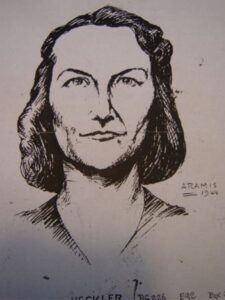
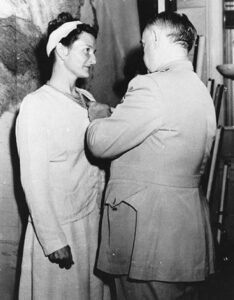 quiet pride in her service to her country, although she always maintained a wry sense of humor about it. Her response to receiving the Distinguished Service Cross was, “Not bad for a girl from Baltimore.”
quiet pride in her service to her country, although she always maintained a wry sense of humor about it. Her response to receiving the Distinguished Service Cross was, “Not bad for a girl from Baltimore.”
While in Haute-Loire, Hall had met and fallen in love with an OSS lieutenant, Paul Goillot, who worked for her. In 1957, the couple married after living together off-and-on for years. Hall went on to head the CIA. The other four heads were men. Hall was code named Marie and Diane, but the Germans gave her the nickname Artemis, and the Gestapo reportedly considered her “the most dangerous of all Allied spies.” Because of her artificial foot, she was also known as “the limping lady.” She died on July 8, 1982 at the age of 76 in Barnesville, Maryland.

